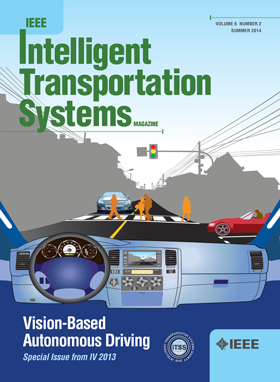Deep Reinforcement Learning-Based Computation Computational Offloading for Space–Air–Ground Integrated Vehicle Networks
IF 7.9
1区 工程技术
Q1 ENGINEERING, CIVIL
IEEE Transactions on Intelligent Transportation Systems
Pub Date : 2025-04-02
DOI:10.1109/TITS.2025.3551636
引用次数: 0
Abstract
In remote or disaster areas, where terrestrial networks are difficult to cover and Terrestrial Edge Computing (TEC) infrastructures are unavailable, solving the computation computational offloading for Internet of Vehicles (IoV) scenarios is challenging. Current terrestrial networks have high data rates, great connectivity, and low delay, but global coverage is limited. Space–Air–Ground Integrated Networks (SAGIN) can improve the coverage limitations of terrestrial networks and enhance disaster resistance. However, the rising complexity and heterogeneity of networks make it difficult to find a robust and intelligent computational offload strategy. Therefore, joint scheduling of space, air, and ground resources is needed to meet the growing demand for services. In light of this, we propose an integrated network framework for Space-Air Auxiliary Vehicle Computation (SA-AVC) and build a system model to support various IoV services in remote areas. Our model aims to maximize delay and fair utility and increase the utilization of satellites and Autonomous aerial vehicles (AAVs). To this end, we propose a Deep Reinforcement Learning algorithm to achieve real-time computational computational offloading decisions. We utilize the Rank-based Prioritization method in Prioritized Experience Replay (PER) to optimize our algorithm. We designed simulation experiments for validation and the results show that our proposed algorithm reduces the average system delay by 17.84%, 58.09%, and 58.32%, and the average variance of the task completion delay will be reduced by 29.41%, 48.74%, and 49.58% compared to the Deep Q Network (DQN), Q-learning and RandomChoose algorithms.基于深度强化学习的天空地一体化车辆网络计算卸载
在偏远或灾害地区,地面网络难以覆盖,地面边缘计算(TEC)基础设施不可用,解决车联网(IoV)场景下的计算计算卸载问题具有挑战性。目前的地面网络具有高数据速率、良好的连通性和低延迟,但全球覆盖范围有限。天空地一体化网络(SAGIN)可以改善地面网络的覆盖限制,增强抗灾能力。然而,随着网络复杂性和异构性的不断提高,很难找到一种鲁棒和智能的计算卸载策略。因此,需要对空间、空中和地面资源进行联合调度,以满足日益增长的服务需求。为此,提出了一种空间-空中辅助车辆计算(SA-AVC)集成网络框架,并构建了支持偏远地区各种车联网服务的系统模型。我们的模型旨在最大化延迟和公平效用,并提高卫星和自主飞行器(aav)的利用率。为此,我们提出了一种深度强化学习算法来实现实时计算的计算卸载决策。我们利用优先体验重放(priority Experience Replay, PER)中基于排名的优先排序方法来优化我们的算法。设计了仿真实验进行验证,结果表明,与深度Q网络(Deep Q Network, DQN)、Q-learning和RandomChoose算法相比,我们提出的算法将平均系统延迟降低了17.84%、58.09%和58.32%,任务完成延迟的平均方差降低了29.41%、48.74%和49.58%。
本文章由计算机程序翻译,如有差异,请以英文原文为准。
求助全文
约1分钟内获得全文
求助全文
来源期刊

IEEE Transactions on Intelligent Transportation Systems
工程技术-工程:电子与电气
CiteScore
14.80
自引率
12.90%
发文量
1872
审稿时长
7.5 months
期刊介绍:
The theoretical, experimental and operational aspects of electrical and electronics engineering and information technologies as applied to Intelligent Transportation Systems (ITS). Intelligent Transportation Systems are defined as those systems utilizing synergistic technologies and systems engineering concepts to develop and improve transportation systems of all kinds. The scope of this interdisciplinary activity includes the promotion, consolidation and coordination of ITS technical activities among IEEE entities, and providing a focus for cooperative activities, both internally and externally.
 求助内容:
求助内容: 应助结果提醒方式:
应助结果提醒方式:


